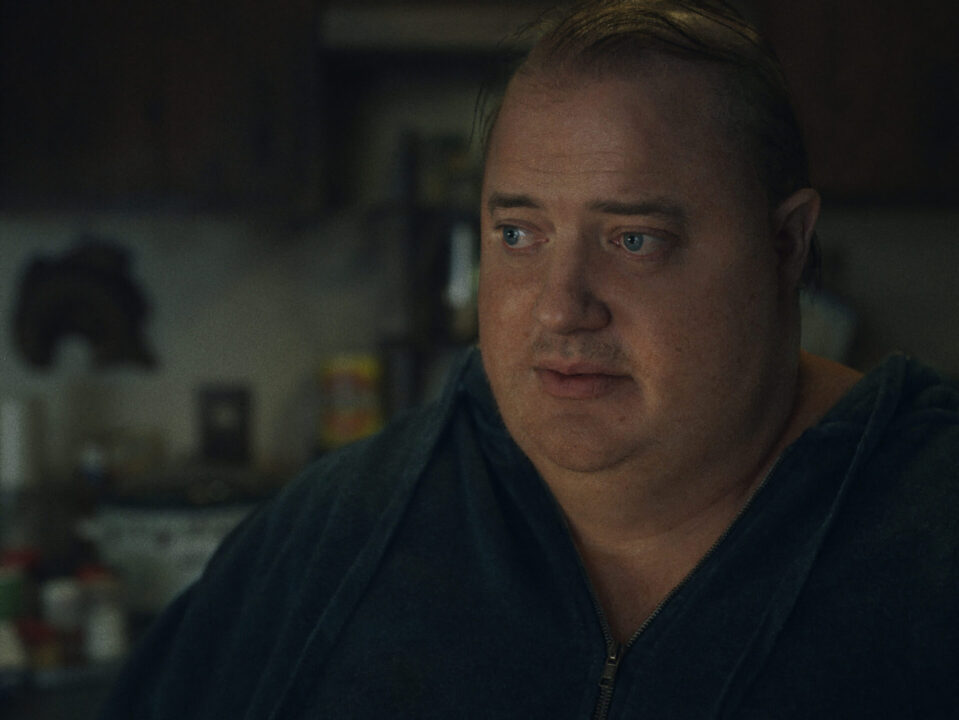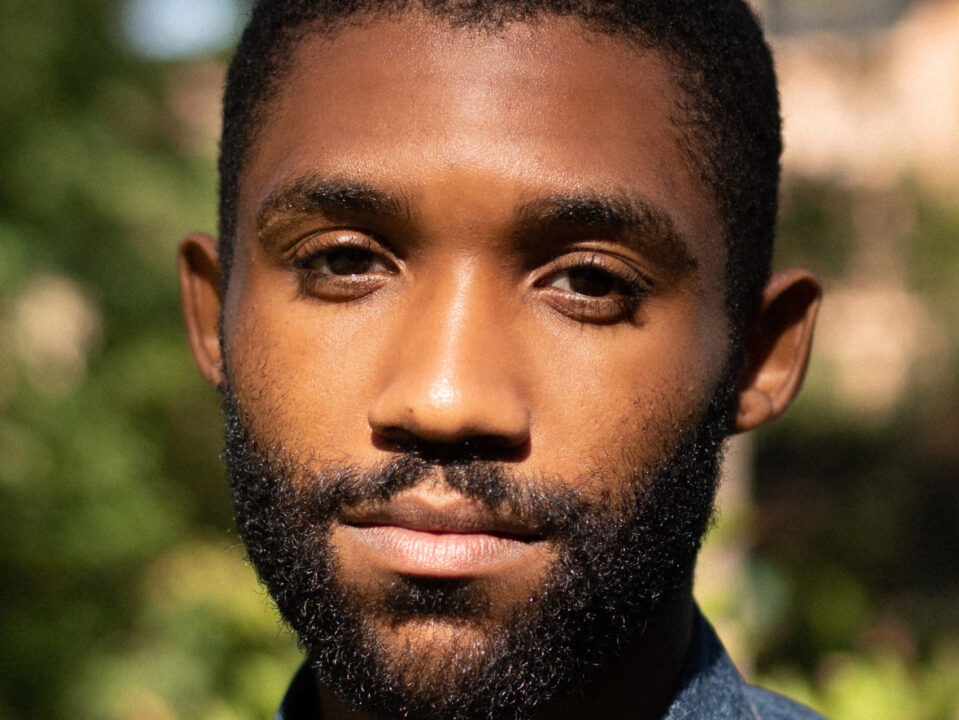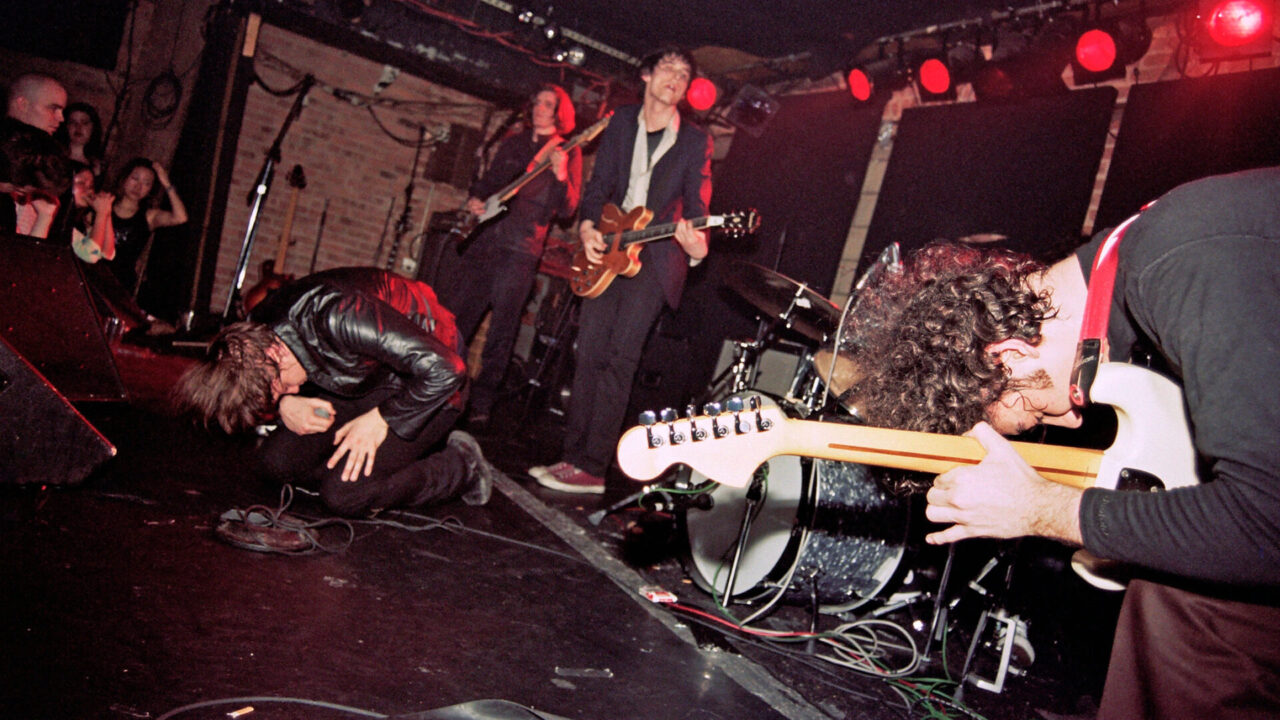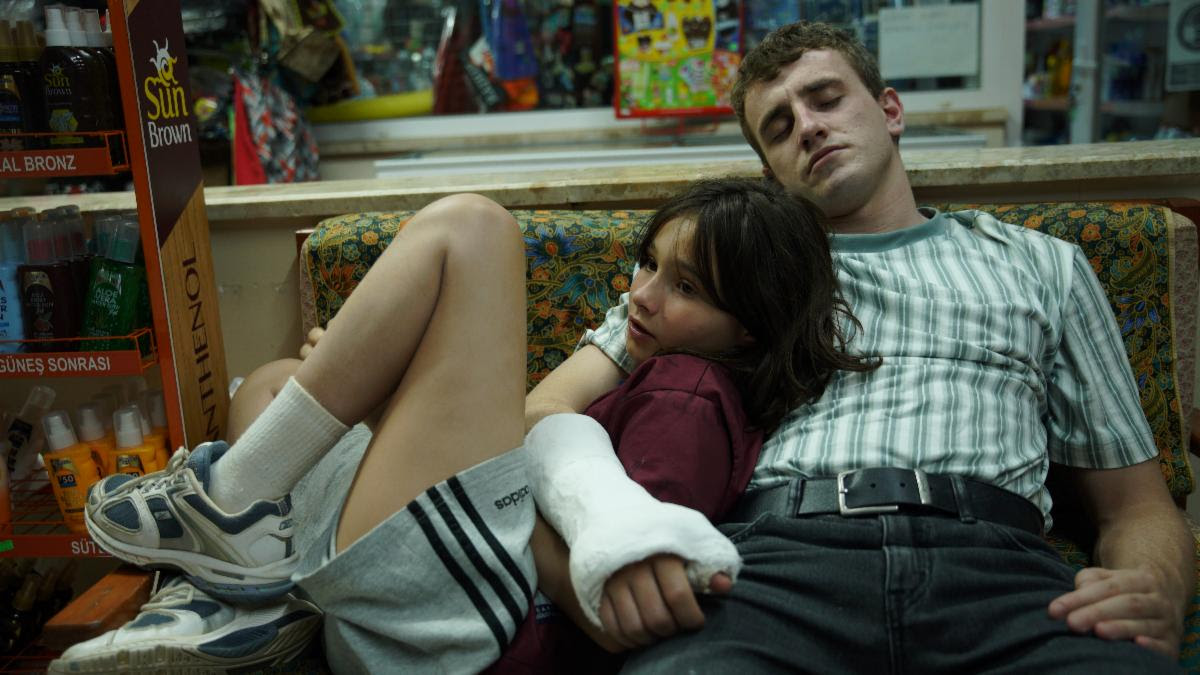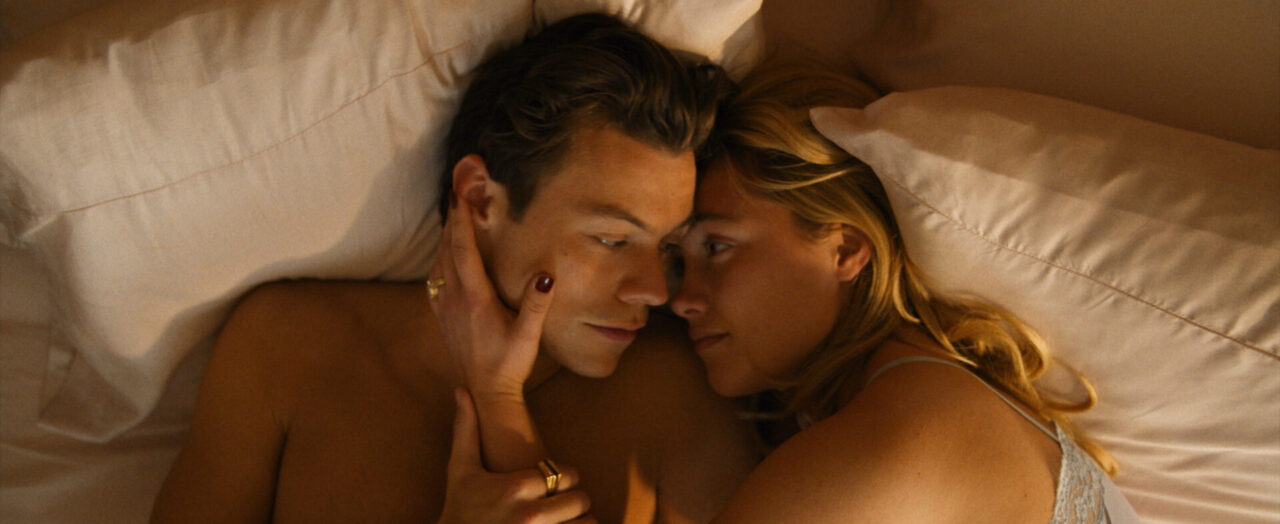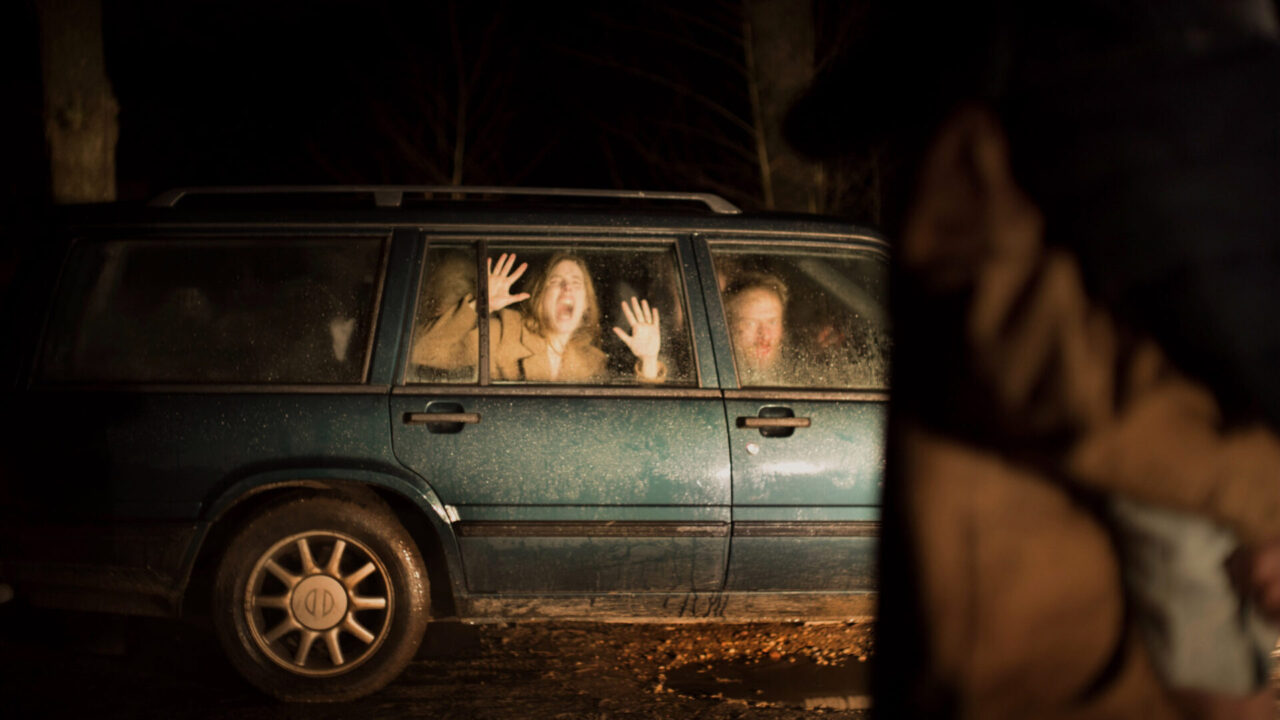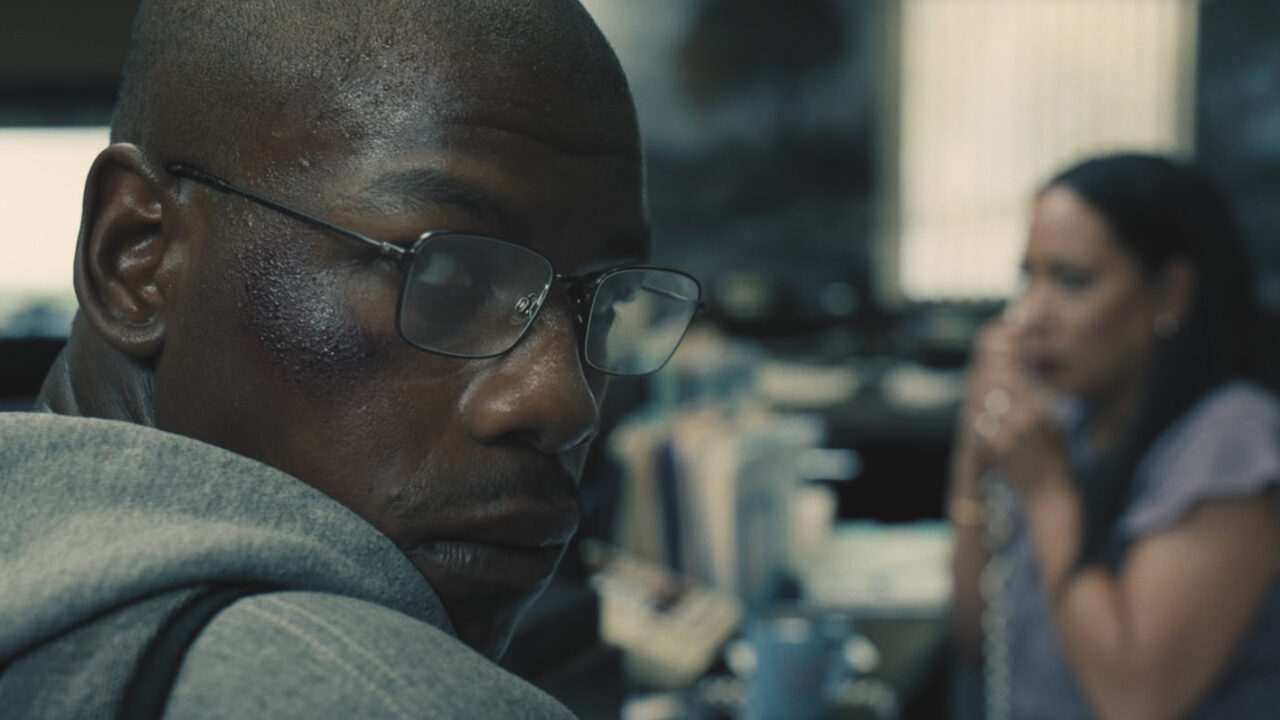The Whale
The first thing you'll notice in Darren Aronofsky's The Whale is its unexpectedly compact format. With a screen ratio of 1.33:1, the frame is nearly square on all sides. Intriguingly, there won't be any extra width for this story.
As the opening title credits began, seeing this already made me feel uneasy. I, like anyone who will be going into this movie, knew that the central character is an extremely obese man. How then, will he fit into this screen for the remainder of the film?
This (intentional) visual restriction immediately sets the stage for a story of discomfort, pain, and struggles to come. As soon as we see Charlie (Brendan Fraser)–by way of an uncomfortably shocking introduction (in many carnal ways)–we see how enormous, and helpless, a figure he is. We know instantly how impossible it must be for him to exist and fit into the world around him.
Except, we quickly see that he doesn't actually exist in the world. Rather, as today's 21st-century accommodations allow, he lives in his own reclusive world; inside, and alone. Teaching an online writing class (one in which his camera remains off), he spends his days either occupying the same flattened corner of his living room couch or traversing the path between his bedroom and bathroom, by way of a walker whose flimsy frame feels as if it could fold under his weight at any moment.
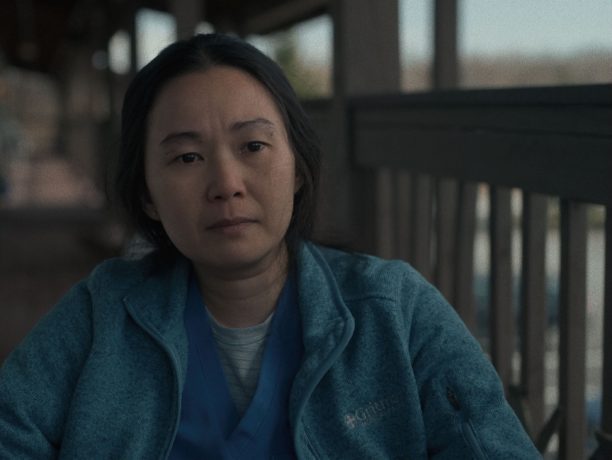
With over 600 pounds of body mass, Charlie is a sight to behold (I say this with no intention of sounding insensitive to the obese community). Yes, Charlie's appearance is shocking, which the film presents starkly. Yet, the film as we see it is one of empathy. Director Darren Aronofsky's singular achievement here is how he draws out the sweet, kind, and tender soul of the man underneath the heavy flesh.
Undergoing an immediate health complication that begins the film, Charlie's nurse and friend Liz (Hong Chau) tells him that he's in grave danger of dying. The episode brings about a forced introspection, one in which he decides to attempt to reconcile with the daughter he left behind years ago (you would be correct in remembering Aronokfsky's other film about guilt by way of fatherly abandonment, 2008's The Wrestler, here too).
We see each day of this final week, with title cards to count them down. Not coincidentally, this narrative structure should also recall the biblical story of creation, in which God created the universe in seven days (we all know what he did on the seventh). Religion and man's relationship with it, and faith and higher powers at large, are always a preoccupation in Aronofsky's films, as it is here too. The film confronts religion by way of a young door-to-door missionary (Ty Simpkins) who befriends Charlie and tries to save him by converting him before the rapturous end times (which are closer for Charlie than the young missionary knows).
The central story in The Whale is that of Charlie reconnecting with his daughter, Ellie (Sadie Sink), a high schooler whose troubling social media accounts reflect her raging, isolated nature. Drawing her to his home, Ellie sees her father for the first time in years–more enormous now than ever. Her moodiness and rage counter Charlie's kindness and sincerity.
Each of these scenes–mostly exchanges between two characters–all start to take on a certain rhythm. If it all begins to feel like a play, it's because the film is based on one. Screenwriter Samuel D. Hunter adapts his 2014 stageplay here for the film (which also lends itself to a COVID production).
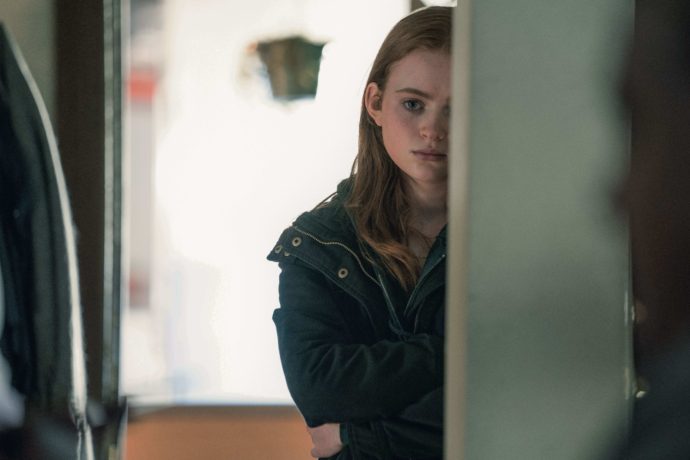
For a film about a 600-pound man, I was very surprised to find how much I connected to it. Timely, issues that we experience now such as self-isolation, self-medication, grief, and shame, are all things that we can struggle with every day. In a post-COVID, mostly online world, I was taken aback to see how easy and dangerous it is to fall into our own worlds of isolation and despair that can grow from shutting oneself off from the rest of the world.
It's a brave story to bring to the screen, and it's Brendan Fraser who deserves every word of praise that his performance is getting. Incredibly moving, Fraser proves he's a singular talent here, bringing a yearning presence to Charlie. Further, he brings all sides to this character suffering from grief and addiction. Communicating the pleasures of inhaling a bucket of chicken wings, meatball subs, or pizzas at any given moment, and then the physical stuntwork as well as emotional depth to convey pain inside a man who can barely move is a feat of acting and should be recognized as such.
Cinema rarely features people like this at the center of the frame, getting their own story. And Aronofsky and team, as well as the obese community, should be proud to see this character and story portrayed onscreen with such compassion and empathy, and heart.
The Whale is a transcendent film, as evidenced by its final shot. As Charlie has been saying to his daughter and students, "be honest." By the time he reaches that pinnacle of truth himself, he is not bound by weight. He is freed by the screen ratio format and even the gravitational forces of this world. Lightness is that thing that exists within all of us if we just choose to lift that weight of despair.
1h 57m. Rated R for language, some drug use, and sexual content.
https://youtu.be/D30r0CwtIKc
Director Chad Murdock Knows The Answers Are Inside Himself
Chad Murdock is a freelance film director, writer, editor, creative director, and composer currently based in Brooklyn, New York. He graduated from the School of Visual Arts with his BFA in Film Directing.
The multi-hyphenate artist spent his formative years in Philadelphia, PA, before moving to New York City to pursue a Bachelor’s Degree in Film Directing at the School of Visual Arts. After graduating in 2019, Chad worked as an in-house filmmaker at Wieden + Kennedy, where he learned how to stretch his creative legs in the advertisement space. He then added more skills to his arsenal when he worked as a Creative Director at Laundry Service.
In 2021, Chad founded the independently owned Studio Murdock™, a home for all of his personal narrative work. From there, he crowdfunded $25,000 to produce and direct his first feature-length film “Fingers In the Wind”, which now serves as the inaugural film under the Studio Murdock™ brand.
Cinemacy: What or who inspires you, both professionally and personally?
Chad Murdock: A lot of people both in my professional and personal circles tell me to stick to my guns. That means a lot to me because it’s very easy to become fixated on what I might perceive as a popular mode of contemporary filmmaking. My work fits in its own world, and I need to respect that, the way I respect other filmmakers who are constantly inventing language.
What was the film that inspired you to enter filmmaking?
I don’t think there was one specific film that inspired me, at least not consciously. If I have to be honest, I actually think my growing up watching anime–in particular the older, more intimate ones from the 80s and 90s like Maison Ikkoku–really influenced my style of image-making and storytelling.
I got interested in the cinema while in high school because I felt really dissatisfied with the photography I was doing at the time. I’m not sure if I’d feel the same way now, but back then I really felt the limits of capturing a still image as opposed to a moving one. Around that time in my life, I was also doing choir, opera, and theater, which I think all had a heavier influence on me than the films I was watching.
Is there a studio that you’d love to work with?
I don’t think there’s a better studio in the world than Studio Murdock. Shameless, but I really feel that way. Obviously, there’s so much for me to learn and I have a long journey ahead of me, but that’s where my heart is. A lot of my favorite filmmakers of the past and of today created their own production companies. There are studios I’d work with for sure because I love making movies, but what we’re doing here is remarkable to me and I want to keep pushing.
Whitney Houston once said, “I’m a gospel hearer. I like to hear words of meaning, and of sweet melodies”. I think about that quote often. When it comes to cinema, I am impressed by films that illustrate meaning in their structure, movement, and concerns.
How did you start out in filmmaking?
I went to film school. I had to make a short film to apply, so I made a short silent film about falling in love in Brooklyn. It’s a horrible film. I had no crew, so I would press record on the camera and then walk into every shot with my actress–who was just a friend I met that summer–and we’d walk around Brooklyn. That was literally it. We’d walk around Brooklyn and fake smile at each other. And then I recorded a score for it with a zoom microphone on top of an old piano and edited the whole thing on Photoshop. It was a mess, but it got me in. It was my first film.
"A lot of people ask me to explain the film’s meaning. I get a little disappointed when that happens; not because I’m afraid they don’t understand it, but because they think anything I say has more validity than their own initial impression."
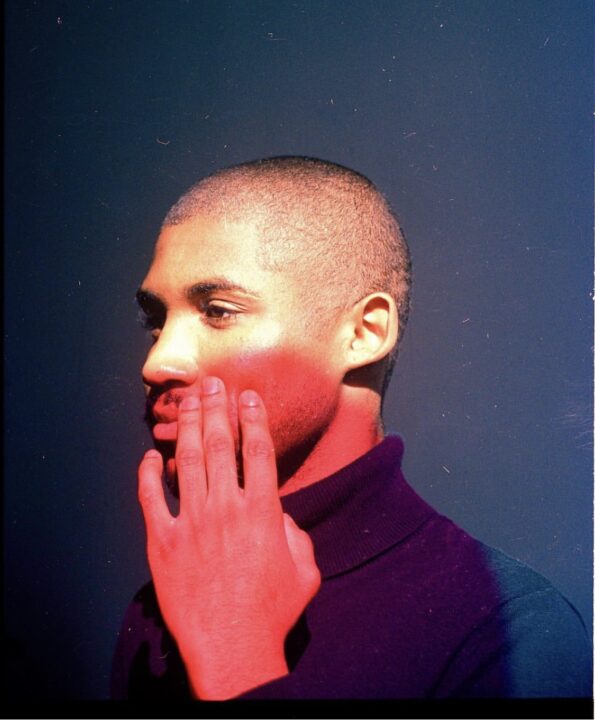
What stories are you drawn to telling? Are there any questions or themes that you are most interested in exploring?
I’d like to think that everything I write is going to be completely different from each other, but as I get older and develop an actual body of work, I can’t help but notice the similarities in my works, and how much they reflect me as a person. I’ve learned so much about myself through writing and watching. Even the films I’m working on now have similar concerns, but explore those concerns in different ways.
It seems I’m drawn a lot to questions about memory, friendship and love, sexuality, parent and child dynamics, and religion. To some, that may seem all over the place, but all these things seem to go hand in hand with me. They’re the makings of me, beyond even just my thoughts.
What was the origin of your feature film debut, Fingers in the Wind?
I was living in Portland, OR at the time and was yearning badly to make a film. I had just graduated from SVA and was working my first adult job. I was so depressed. I was watching movies every day after work and not really speaking to anybody. When the pandemic started, I began writing a short film about a young man who bought flowers for himself for the first time and didn’t know what to do with them.
We planned to shoot it just before I had plans to move back to my family’s home in Philly, but the week we were set to shoot the entire state of Oregon caught fire. It was the most incredible thing I had ever seen. Smoke and ash filled the air, the sun was blood red, I couldn’t breathe let alone make the film, and my love life was in a peculiar transition. It was incredible, and to top it all off I had lost my wallet a couple of days before my flight. So I kept the script and moved back to Philly.
https://youtu.be/ysSUh7mhk8g
When I moved back, it was the first time I had lived with my parents since I was 17. I felt strange. So I decided to write another short film. Suddenly, I had two ideas and wanted to make a feature that involved three stories that were only connected by the film's movement. It didn’t necessarily work out that way, but that was the genesis for ‘Fingers in the Wind’. Ideas and movement.
What have you learned following the making and exhibition of your film?
I’ve learned a lot about myself and about filmmaking. A lot of things you can only learn by doing. I think most importantly, I’m really learning about the kind of filmmaker I want to be and who I am as an artist in general. I’ll always be searching, and my films will probably always reflect that, but I feel very comfortable with the journey that I’m on, even when I’m frustrated. This has been a great ride so far. I felt very affirmed while screening the film for audiences. Their engagement with the film means the world to me.
What three takeaway lessons have you learned in your journey so far that aspiring filmmakers should also know?
Somewhat similar to my first answer: stick to your guns. You’re special and unique. There is a lot of repetition in these streets, not just in cinema but in the art world in general right now. It’s sad and numbing, but don’t let it get to you. Don’t fall for the trappings of late-stage capitalism that lurk in every creative industry. I heard Spike Lee once say “Don’t worry about the industry”. That’s probably the hardest thing to do as a young filmmaker; to not worry about the industry. But he’s right. Don’t worry about the industry.
What is your take on the current state of cinema? Are there any issues you see, and if so, what would you do to fix them?
Often I feel we’re at a standstill in a really bad spot. There is definitely a war on arthouse filmmaking going on, and it really saddens me. I try not to worry about the industry too much, but I read a lot about the history of cinema, and I know we’re just simply in a different world. I don’t have any solutions, obviously, but I do think we need to change our ideas about the costs of filmmaking–literally, we shouldn’t assume it costs millions upon millions of dollars to make an average movie–and be more discerning about what is cinema and what is not. I’ll just leave it at that. I’m optimistic that audiences will always be thirsty for new and exciting films that do something with the form.
If there was one message that you would want audiences to take away after watching your work, what would it be?
Remain curious, and seek answers within yourselves because everything you need is already inside of you. A lot of people ask me to explain the film’s meaning. I get a little disappointed when that happens; not because I’m afraid they don’t understand it, but because they think anything I say has more validity than their own initial impression. As the audience, if a film moves you, or if any part of a film moves you, you ought to ask yourself how and why you think it did. What direction did this film move me in? What connection do I have to these characters in this world? What about the form of this film made me feel the feelings I felt when watching it? And what inside of me caused this relationship I now have with the film? I think if audiences begin to engage with films that way, examining their relationships with them instead of asking the director to tell them how they’re supposed to feel, then they will feel much more fulfilled when they engage with meaningful work.
You can follow Chad Murdock on Instagram, Twitter, Vimeo, or Studio Murdock online.
'Meet Me In The Bathroom' Relives The 2000s Indie Rock Boom
I’ve been to many concerts this year. Luckily, I've been able to see some of my all-time favorite bands: The Strokes, LCD Soundsystem, and Interpol. Not only are they all still together but they’re still touring, and continuing to make new music. This is especially impressive when you consider that they all started out in the early 2000s, and did so while they were just in their early twenties. Born out of a truly independent music scene and looking for a new scene in rock, these bands–as well as the Yeah Yeah Yeahs and others–would create a new wave of rock music, which is captured in the new documentary Meet Me In The Bathroom.
Released by Utopia, Meet Me In The Bathroom chronicles the rise of this indie rock scene and its lasting influence on the music scene today. It's based on the 2017 oral history book of the same name by Lizzy Goodman. The film combines interviews with everyone who was there to tell the story of the scene in their own words.
It’s a fascinating read (did I mention I’m an enormous fan of all of these bands and music?). Directors Will Lovelace and Dylan Southern (who co-directed the LCD Soundsystem concert doc Shut Up and Play The Hits) bring a similarly direct approach to telling the story, by way of using entirely archival footage.
The look of the film–all VHS “home movie-Esque” record footage–lends nostalgia to the feelings, of traveling back in time. There are no modern-day interviews, which feels totally transportive to the era. With incredible never-before-seen footage, we see what it was like to live in New York City. A city on the cusp of the new millennium, pre-internet, and pre-9/11.
As the doc shows, a few bands–looking for a new kind of rock music–emerged with a “new cool” rock aesthetic. The Moldy Peaches, Yeah Yeah Yeahs, and the band that would single-handedly explode the scene–The Strokes–all changed music history. After the Strokes’ overnight success, new bands were born: Interpol, TV On The Radio, and later, LCD Soundsystem.
The footage of these bands from some of their earliest shows is incredible to see. You get to see them at their very beginnings here. Karen O of Yeah Yeah Yeahs and Paul Banks of Interpol introduce themselves to the camera for the first time. They play songs in small clubs like the lower east side Mercury Lounge. And it's all incredible footage for fans to see.
Meet Me in the Bathroom also shows the larger, pivotal moments in New York history: Y2K; the rise of the internet, and Napster, to which some bands started losing money to the free pirating program. And then, of course, the attacks on the World Trade Center. That footage is so raw and horrifying that it’s devastating to watch at times. It would, of course, have a major effect on them all.
Ultimately, the thing that comes across so prominently now is these young people’s aspiration to be tomorrow’s next rock stars appears to be born out of a need for acceptance. While brilliant musicians and artists, Julian Casablancas (The Strokes), Karen O (Yeah Yeah Yeahs), and Jame Murphy's (LCD Soundsystem) desire for rock stardom mask a seemingly large insecurity they had as younger people. It’s saddening to witness how corporate record labels and commercialism started to affect them on their rise to fame.
Meet Me In The Bathroom is full of nostalgia and exceptionally amazing moments, and I hope will turn more people on to this music. It’s a trip down memory lane that chronicles rock and roll and youth. It could just also inspire the next great wave of rockers and artists.
1h 45min. ‘Meet Me in the Bathroom’ is now playing in select Los Angeles and New York theaters.
Aftersun
There is a heartbreaking recognition that Aftersun confronts us with: even the best moments of our lives are temporary. Eventually, they will pass and become memories.
Aftersun takes place during a week-long vacation between Sophie (Frankie Corio) and her young dad, Calum (Paul Mescal). Set in a sunny Turkish beach town (more specifically, at a modest resort that the young dad can afford), Aftersun shows the simple yet important moments that also suggest the start of a pivotal time of coming-of-age.
The small, overlooked moments between parent and child–such as having your sunscreen rubbed in at the pool, lazily hanging around the hotel room, and snickering together throughout cheesy dinner shows–are rendered with incredible observation and an authentic heart that is emotionally moving.
The entirety of the film is naturalistic, unflashy, and full of warmth, due in large part to the nostalgia of the '90s time period. We return to the pre-cell phone, pre-digital distraction age (of which my own childhood vacations also took place).
The special bond that Sophie and Calum have can unmistakably be attributed to their shared youth. She's eleven, he's thirty-ish–somewhere between a child and an adult himself (his arm cast might imply that he too might still have some growing up to do). Sophie's young maturity and Calum's natural playfulness create an incredibly close relationship. They are each other's worlds.
However, through subtle storytelling, we soon feel a psychic disturbance that this idyllic vacation may be covering a deeper conflict. Early on, Sophie grimaces while seeing Calum's "weird ninja moves," but his Tai Chi practice–photographed more saddeningly later on–suggests that he's struggling to tamp down an inner conflict that Sophie isn't aware of, and too young to be to understand anyways.
As days pass and the vacation starts to reach its inevitable end, Calum–as if anticipating something we're not aware of–becomes increasingly unsteady. We're left hoping for the best despite the red flags, but the optimism is hard to sustain, especially in the film's final shot. I'll proceed without going into further detail, as I found that Aftersun's emotional impact comes from the slow reveals.
Bringing this story to the screen is first-time feature filmmaker Charlotte Wells. This directorial debut is such an impressive accomplishment, as it's easily one of my favorite films of the year. Wells' natural ability to capture and realize profoundly small moments also makes sense when you consider that Aftersun was inspired by her own childhood. The act of rendering a troubled past onto the big screen reminded me of Johanna Hogg's The Souvenir, another emotionally wrought and devastatingly personal film.
One of the best parts of the film is Wells' choice to weave in the recorded home video footage that Sophie takes throughout the trip. The grainy, shaky handheld footage of Sophie–face covering the screen–makes for a sense of present and past all at once; as if we're both experiencing their vacation in real-time, as well as watching it as a memory.
As Sophie gets ready to board the plane back home to stay with her mother, Calum uses his camcorder to capture the last few moments he has with his daughter. He records Sophie waving goodbye, and can't help himself from rewinding, fast-forwarding, and replaying that moment as soon as she leaves his line of vision. It's heartbreaking. There's an ambiguousness to what might have happened following that.
Aftersun creates incredible depth in showing just how impactful the subtle moments between a parent and child can be. Understanding that although moments don't last, no matter how badly we wish we could pause time, there is a sense of optimism when we realize that we'll always have the ability to keep those memories alive.
1h 42min. 'Aftersun' is rated R for some language and brief sexual material.
God's Creatures
God's Creatures, the new film from distributor A24, is a finely made, emotionally affecting work. By its end, you will be quietly shaken to your core. The patience and restraint with which co-directors Anna Rose Holmer and Saela Davis (The Fits) use in divulging its small plot's dramatics make for an impactful ending that will force you to confront both your personal ethics and your place within the larger world.
Related: 'The Fits' Proves That Creativity in the Film Industry is Not Dead
Stormy Clouds Ahead
The story takes place on the Irish coast. Constantly cloud-filled skies and stormy seas make for tough living conditions. It's what gives the townspeople their steadfast resolve to face life's many harsh realities.
These blue-collar workers–all of whom either fish the open seas or clean that day's catches–are tough. They're without many words, quietly committed to the immediacy of the job at hand.
Sharing small-town gossip or a cigarette break provides simple relief from an otherwise droll day. Maybe singing a traditional Irish song or having a pint or two after work.
The flip side of this life is the danger that's also near. An unexpected sea change at any moment can claim the life of any unsuspecting fisherman. Call it hazards of the job.
The relentless, merciless routines of life are what keep these people–and generations of families– humble, as well as religiously devout (cross-holding Catholics). You know your place in life and live out the joylessly familiar, unchanging seasons that always repeat.
That is, until whispers of an allegedly shocking event in the community begin to transpire, which slowly frays the fabric of everyone's lives forever.
A Slowly Unfurling Story
God's Creatures has a fairly simple plot. When a mother's (Emily Watson) son (Paul Mescal) unexpectedly comes home after many years away, only to coincide with new rumors of a supposedly dark event that took place, Aileen (Watson) reckons with protecting her son or the acknowledging of a possibly dark truth.
Without giving away any details of the act in question (which the movie mysteriously teases), the film takes us on an emotional journey that tracks the stress of guilt on Aileen's soul, as she struggles to feign ignorance of stories that make Brian (Mescal) out to be a perpetrator of a gruesome act.
Conversations that once flowed cheerfully between Aileen and her colleagues at the fishery grow short and sparse. Soon, silences and purposefully diverted eyes begin to ostracize Aileen, making for a tense emotional journey that grows heavier as the film goes on.
It's a plot that may be simple in structure, but the way that co-directors Holmer and Davis tell it is very impressive. The measured way in which information is slowly learned–ultimately revealing a picture that grows unnervingly clearer (aligning with the inevitable weakening of Aileen's own chosen ignorance)–is excellent filmmaking.
Moreover, connecting the small human drama to the larger universal level is where the film reaches another point of acclaim. Credit editors Jeanne Applegate and Julia Bloch for attuning the audience's senses to the rhythms of life, where imagery of a bottomless sea feels suffocating, and the windswept swaying of seagulls in the sky show what freedom and relief must feel like.
God-fearing Creatures
Starring in the film are Emily Watson (born and raised in London), and Paul Mescal (an Ireland native), who here play a mother and son. Both are exceptionally fine actors, able to convey cavernously deep emotional inner depths.
Watson is the film's central character and the film's emotional center. The story's suspense essentially hinges on Waton's face, in which we know where we're at in the movie by the emotions she chooses to hide and reveal. Watson's performance is exceptional.
Mescal–whose work I personally haven't been too familiar with (no, I haven't yet watched the acclaimed series Normal People)–is quickly proving to be a star in this "A24 indie drama" space. It's thrilling that Mescal's talents align with his interest in being in more serious, smaller arthouse fare (he also captivated me in the soon-to-be-released drama, Aftersun).
There's one person I haven't mentioned yet, and she's who actually cements the entire film. And that's Aisling Franciosi, who here plays Sarah Murphy. While Watson and Mescal convey mysterious uncertainties with their performances, Franciosi's performance–that of a young woman who is allegedly assaulted–is the most wide-ranging. She inhabits every part of this young, pure-hearted small-town girl, whose singing voice feels like a sliver of beauty and hope; a port in an otherwise dark storm.
Directors Saela Davis and Anna Rose Holmer have succeeded in their second feature film, God's Creatures, connecting a small human drama to the larger forces of life. In the end, the takeaway is two-fold: we see how painful and harrowing life can be. But sometimes, if we're able to survive and confront our personal storms, we can write ourselves a new life.
1h 40m. 'God's Creatures' is rated R for language.
'Don’t Worry Darling': A Stylish, Massively Underwhelming Misfire
If you keep up with news of the latest movies–or that of Harry Styles–chances are that you’ve also heard about the new movie Don’t Worry Darling. And if you have, what you’ve also likely heard are the tabloid-worthy headlines detailing its alleged production woes.
Controversy has followed Don’t Worry Darling since the beginning. From high-profile casting shake-ups shortly before the film’s shooting, to a scandalous on-set romance between the film’s director and its leading male (global pop) star, even up until its cringe-worthy world premiere at Venice Film Festival (which set the internet ablaze with #spitgate), perhaps no other movie in recent memory has generated as much gossipy and salacious drama as this has.
And now, as the film finally hits theaters, the question becomes: is the film actually any good?
What general audiences seem to agree–and what this reviewer is personally confirming–is that no, Don’t Worry Darling is not good enough to transcend its own self-generated scandalous fodder. While I found the film to be visually enjoyable, ultimately, it's under-written, poorly directed, narratively underwhelming, and overall quite boring. Audiences are likely to only remember Don't Worry Darling as a misfire that also stirred a lot of supplemental controversy.
It doesn’t bring me any inner delight saying this. In fact, I anticipated the film’s release at the time of its announcement. It's true that there are a ton of talent both in front of and behind the camera. Olivia Wilde had previously won over audiences (and myself) with her directorial debut, the fresh and fun high school buddy comedy Booksmart; so the announcement that she would be following that film with one that’s best compared to The Stepford Wives and The Matrix was intriguing. But now, that choice just rings as confusing.
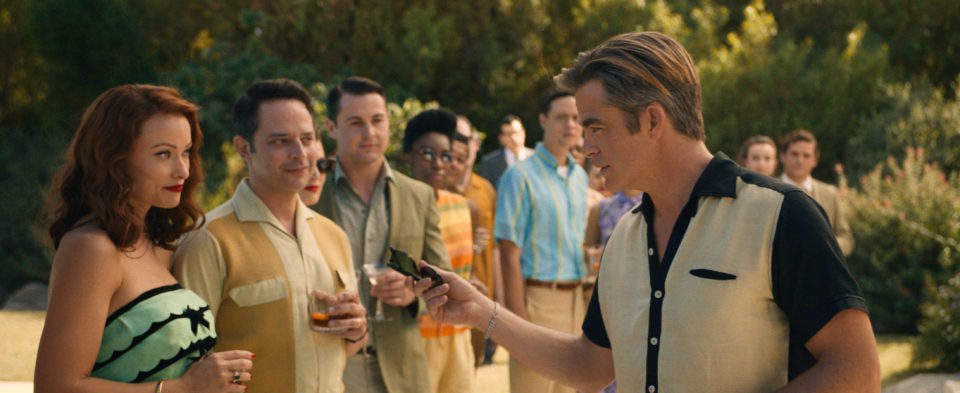
If you’re aware of its marketing, Don’t Worry Darling teases a world of 1950s American utopia; one in which sharply dressed men return home from work every day in their flashy Cadillacs, all awaiting a martini, a pot roast, and a smile from their doting, subservient wives. It's an intoxicating Mid-Century Modern world to behold where young couples and families live in marital bliss. Among them is Alice (Florence Pugh), who enjoys her life of cleaning, cooking, and bedding her husband Jack (Harry Styles).
It’s not long before inexplicable cracks start to appear in Alice’s life. Flashes of nightmarish imagery break a perfectly manicured day; cracking an egg reveals nothing inside; and a house whose walls are slowly–literally–suffocating her. It slowly leads Alice to question her life as well as the vision of Victory’s dangerously charismatic leader, Frank (Chris Pine). From there, the film takes predictable steps towards a simultaneously baffling and underwhelming ending.
Don’t Worry Darling at least has the intention of being a high-concept film, aiming to excite and challenge adult movie-goers. But ultimately, the film suffers from an empty story and confusing logic. Florence Pugh–who never gives a false note and who regularly steals every movie she’s in–does the same here. But Olivia Wilde doesn't communicate a clear enough vision for Pugh, or her co-stars Harry Styles and Chris Pine, as to the movie's intentions. Is it a social commentary? A silly satire? A sci-fi horror? Or, all of the above?
I’ll admit that following the tabloid headlines around Don’t Worry Darling was entertaining and enjoyably juicy while it lasted. Now that the film has debuted to disappointing results, there isn't really much here to worry, much less care about.
123 minutes. 'Don't Worry Darling' is rated R for sexuality, violent content and language.
https://www.youtube.com/watch?v=FgmnKsED-jU&ab_channel=WarnerBros.Pictures
'Speak No Evil' May Be The Most Disturbing Movie of the Year
While introducing his new film Speak No Evil during its world premiere at the Sundance Film Festival–where it played as part of the fest's Midnight section–Danish director Christian Tafdrup shared with his virtual audience, "I wanted to make the most unpleasant watch ever."
As if that weren't enough to put everyone on edge, Tafdrup continued to share that in writing this movie, he was inspired by the filmmaking of none other than the king of discomfort, Lars Von Trier. That was enough to set my heart pounding, unsure of what sort of depraved evil would be in store for us all. And after watching Speak No Evil, I was only barely prepared for what horrors lay ahead in this smart, disturbing and heart-pounding new Danish horror film.
When a Danish family of three vacations in Italy one summer, they are pleased to meet a fun Dutch family at their shared lodging. Bjørn (Morten Burian) and his wife Louise (Sidsel Siem Koch) are excited to bond with the charismatic Patrick (Fedja van Huêt) and Karin (Karina Smulders). It's also fitting that their young daughter Agnes (Liva Forsberg) is also around the same age as the couple's son, Abel (Marius Damslev).
It's a fun affair but the magic of the Tuscany vacation becomes a distant memory when Bjørn and Louise return to their humdrum lives (he's clearly unhappy with his normal life). It's not until a year later when a postcard arrives–a photograph of both families together from their idyllic Italian summer–that their spirits lift. They've been invited by Patrick and Karin to reconnect and spend the weekend at their home; and offer that excites them, to which they accept.
A short 8-hour car trip away, Bjørn, Louise, and Agnes arrive at their host's house deep in the woods (the kind of place that would be very regrettable to get stuck in, on the unlikely chance that any danger should arise). They are instantly greeted and welcomed by fun-loving Patrick and Karin, and the promise of a fun weekend lies ahead.
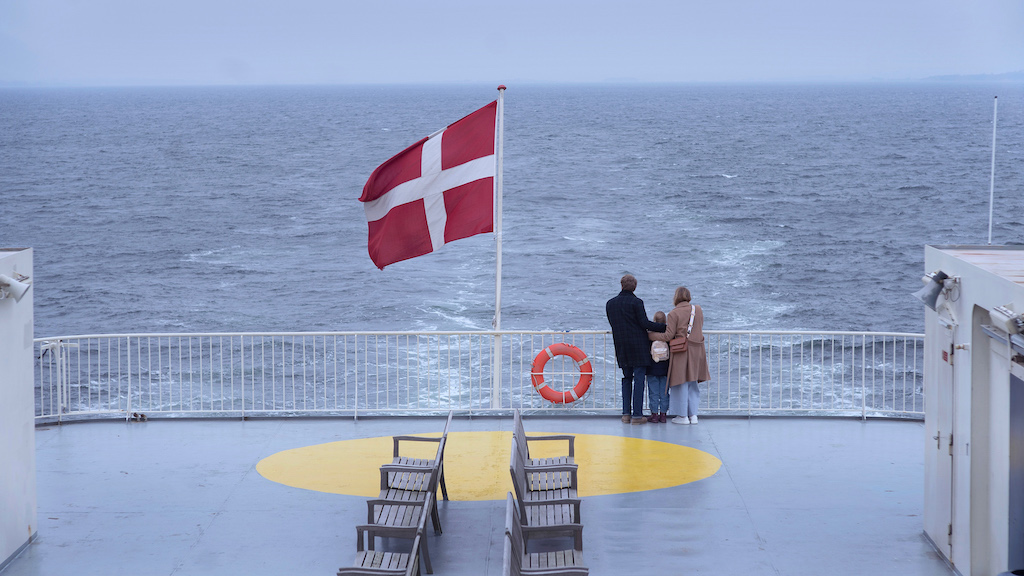
However, small awkward cues arise in Patrick and Karin's hospitality that cause unexpected moments of unease to Bjørn and Louise. Little things that were so touching over that summer–Patrick's compliments over Louise's vegetarianism–are forgotten, with wild boar being that night's main course. But Bjørn and Louise, not wishing to rock the boat, brush it off, and continue with the weekend. It's not life or death, anyway.
It should be said at this point that Speak No Evil makes no attempt to hide its horror leanings. Tafdrup uses a sweeping symphonic score of strings that cause your body to tense up during their car trip to the house, and the loud, rustling of leaves once they're there only stir further dread. But it's the small moments of observed human behavior that Tafdrup is so skilled at capturing, making the audience cringe with discomfort, building a slowly rising tension.
Fedja van Huêt, Sidsel Siem Koch, Karina Smulders and Morten Burian appear in Speak No Evil by Christian Tafdrup, an official selection of the Midnight section at the 2022 Sundance Film Festival. Courtesy of Sundance Institute | photo by Erik Molberg.
Unfortunately, Bjørn and Louise's uncertainty with the weekend continues, especially when they learn why Abel stares strangely and groans loudly at night: Patrick and Karin share that he has a rare disease that stopped his tongue from growing. An awkward dinner the next night leads Bjørn and Louise to wonder if, maybe they aren't the same fun-loving family they met on vacation, and perhaps it would be best if they cut the trip short and went home.
To give anything else away at this point would undoubtedly spoil the rest of the film's fun, and there is quite a lot of twisted reveals ahead. Co-written with his brother Mads, Speak No Evil is Tafdrup's third feature film and also his first to get accepted into the Sundance Film festival. Surprisingly, it's also his first attempt at making a horror film. "I have no experience with making horror. I'm not a horror fan, I like to use it in an artistic way."
Approaching the story from this angle is what makes Speak No Evil such a unique and affecting movie. Creating characters with such developed stories and real human desires (Bjørn's dishonesty with his boring life and Louise's niceties to others) is a smart way of leading them into the danger ahead. The way we act in everyday life–what we don't say or wish to admit about ourselves, and what we hold back from others for the sake of being polite–can have the direst consequences. Speak No Evil very much intends to leave you speechless, and believe me–it will.
This review was first published on January 26, 2022 during the Sundance Film Festival.
In 'Breaking,' A Desperate John Boyega Holds a Bank Hostage
Based on the true story of when former U.S. war veteran Brian Brown-Easley held a bank hostage after being denied his disability pay from the VA, Breaking (formerly 892) is a suspenseful thriller that also shines a poignant light on the injustices that veterans still suffer in our country today.
Directed by Abi Damaris Corbin from a script she wrote with Kwame Kwei-Armah (based on this article), Breaking combines the best of big-screen movie-making with more emotional, human storytelling. I've seen and enjoyed Hollywood's exciting hostage standoffs before, but knowing that this story was based on a real event makes the film resonate a little differently while watching.
In the lead role, John Boyega plays the aforementioned Brian, a former U.S. Marine who now collects disability payments just to get by–which he's barely doing. He makes long walks to his low-income motel where he stays, and his only relief is talking with his daughter on the phone every night (but even that gets cut off). When a processing error from the VA denies Brian's latest disability payment, he's threatened with becoming homeless, and he's finally pushed to the brink.
The next day, Brian calmly walks into a local Wells Fargo bank in Atlanta and, after politely interacting with the bank teller, calmly informs her that he has a bomb in his backpack. Here, the story is set on its suspenseful course. But something's different about this holdup. Brian lets most of the people in the bank go right away, and calmly requests his demands: to speak to a hostage negotiator and have his story televised by the local news outlets.
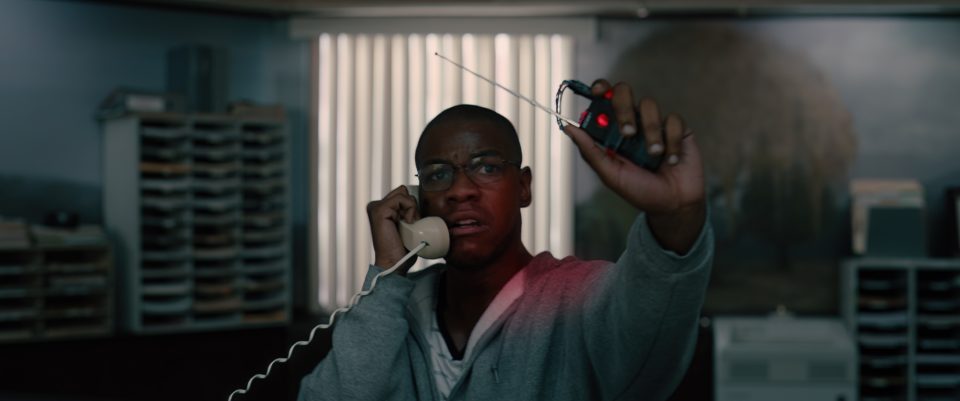
We find that Brian is a man who, although incredibly conflicted, still has a good heart. It's clear he doesn't intend to do harm to anyone, including his two hostages, Estel Valerie (Nicole Beharie) and Rosa Diaz (Selenis Leyva). He apologizes repeatedly to them for the situation he's put them in, and at one point even answers one of the bank's phone calls from someone asking questions about her 401k–who he attempts to help. When the bank offers to credit his account, he denies the offer. It needs to come from the VA, and the events that he's creating are the only way that they, and the rest of the world, will finally listen.
It's exciting to see Boyega in this role, playing a real-life character from this world, and not a galaxy far, far away. Boyega's baggy clothes, raspy voice, and simple speech convey a different side of his acting that we haven't seen before, and extends his range greatly. The journey that Brian goes on is a demanding one, requiring everything that Boyega's got.
As the situation escalates, he talks with a news producer (Connie Britton) and eventually, the hostage negotiator (Michael K. Williams). A former veteran himself, his conversation with Brian creates a connection between them, and a bond forms. He sees Brian's plight, and his safety becomes his own concern as well. In his final film role, Williams commands the screen every time we see him. His presence alone gives unparalleled gravitas to this, as well as every film he's been on. And while he will sorely be missed, this is a worthy final performance to remember the late actor by.
Corbin balances the rising suspense of the hostage standoff along with the more intimate scenes of Brian and his tight circle of confidantes. Scenes with Rosa and Estel make us empathize with him more and more. As the suspense grows–from a quiet sunny day to, at its highest point, a barrage of helicopters, tanks, pop-up command centers, and reporters–Breaking also keeps Brian and his mission front and center. When we finally learn how much money he was denied and that he's asking for now, it stops the movie in its tracks with impact. Considering the dangerous situation he's put himself in (and how he knows he may not make it out alive), you realize that it's not the amount of money he's asking for that he's truly after, but simply raising awareness of the injustice that he, and many others, have been denied.
Without giving away the ending, Brian would likely be pleased to know that his story is now being told, and shared with the world. I hadn't heard this story before seeing this film, but now that I have, I'm saddened to think about the desperation that some people are met with, and the lengths they'll go to to make amends. Brian Brown-Easley shined a light on a deep problem in our country, and Breaking furthers that story. It's an issue that needs to be corrected at the federal level in order to ensure that those who serve our country need to be served back.
This review originally ran on January 25, 2022 during the Sundance Film Festival.
https://www.youtube.com/watch?v=5Vi3EhaNOII&ab_channel=BleeckerStreet

